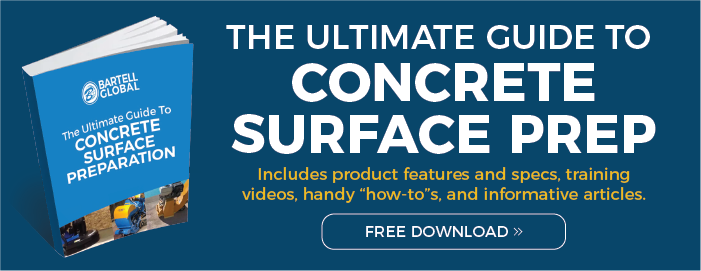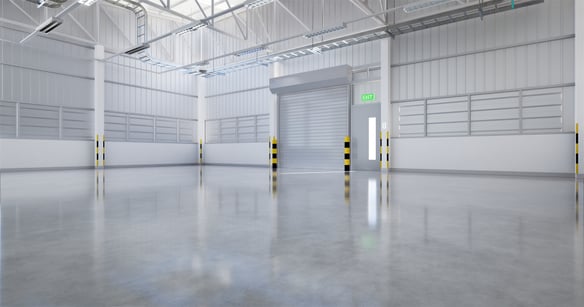
There is no question that a polished concrete floor is super durable and looks awesome. And it is very cost effective when you factor in the life of the floor. Its why so many people prefer it to other flooring solutions. But not all concrete floors are created equal.
Grinding and polishing a concrete floor does not ensure that you will get a beautiful looking floor. Sometimes you don’t get a beautiful result. Why? Because in essence – polishing concrete can only reveal and enhance what is already there. It doesn’t ‘hide’ or cover the imperfections in the existing floor – it enhances them. And as a result, if you have an ugly floor to begin with – your end result after polishing will be a shinier, well-sealed ugly floor.
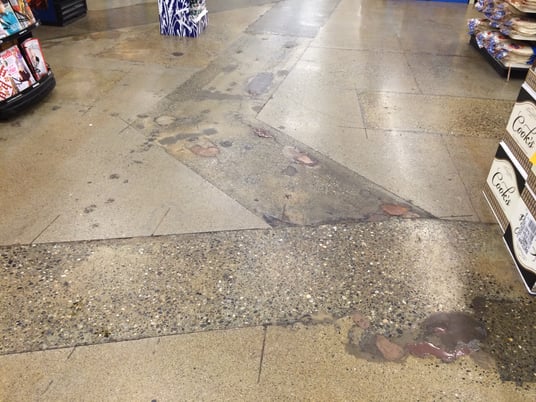
For example, take a look at the real job site photo above, this is actually in a grocery store that I often shop at myself. and, being in the flooring trade for so many years I find it hard to look at anything but the floor when I'm there! But, I will tell you the ugly truth, ( sorry for the pun )…. this concrete floor is polished and it is sealed, it no longer dusts, it is preforming reasonably well,.... but, it is an absolute mess of a floor aesthetically! You can see trenches, spalling, ugly epoxy fillers, patches over patches, color differences and more, making this concrete floor so unattractive. It is so bad that it almost becomes interesting in a strange way, you can find yourself fixated, wandering the store and wondering what polished concrete horror awaits you in the next aisle!
So, what can be done when you encounter a floor like this? what are a contractor’s or end-user's options? And what are the approximate costs associated with each of your options when dealing with a concrete surface like this?
There are a lot of options contractors and end-users have but, I came up with five possible solutions that are very common alternatives to polished concrete floors we can consider. let’s take a look at each of these and see if one is a better solution than another for your specific project. But, before that, allow me to make the following disclaimer on pricing.
Before we discuss options – lets understand pricing.
As the product trainer for Bartell Global, I get asked almost daily about price per square foot for all kinds of services, from - shot-blasting – scarifying – diamond grinding – floor removal – prep and install of new flooring and I want to tell you what I tell them - Pricing is subject to many factors. There are so many variables that can affect the price of a project, thing like: jobsite conditions – geographic location of the projects – the accessibility of the project - time constraints – off hour work requirements - the amount of competition in the area – even the basic economic health in different areas contribute to a really wide cost swing when considering pricing.
So, for this article I will have to keep things general and average priced. I will estimate the cost in US dollars and base the cost on what I know is average for many markets. But keep in mind – this may be a far cry from your current project based on some of the unknown factors stated above. So, I always encourage contractors and end-users to get local advice when seriously considering the cost of your project.
Looking at options for ‘fixing’ ugly concrete floors.
Below are the 5 possible solutions for fixing ugly polished concrete. There are other options – but these would be the most common top 5 solutions.
- LIVE WITH IT….
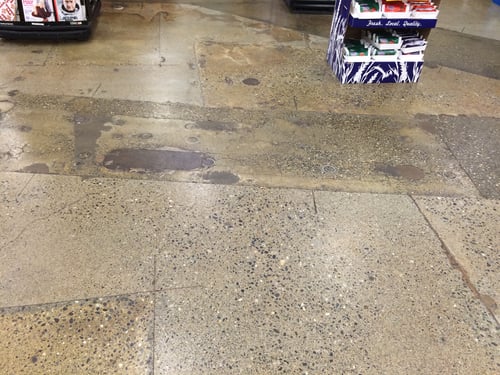
OK, let’s get this option over fast, the fact is that some companies like the store in the images above decide to just “live with it”. You can say yeah, it’s ugly. It’s the “personality” of the slab and live with it. Because, the concrete is performing fine, it’s densified, there are no tripping hazard, it is not “dusting” anymore. So, it is just a cosmetic issue, So, we will “live with it” ...it is an option, an ugly option. But it’s an option that costs you nothing.
Another question an end user may ask is, “where is this ugliness? Is it in the front of the store for all to see? Or, possibly back in the plumping department where no one really cares, so location of the imperfections play a role as well. So, option #1 no cost, no down-time, no interruptions in your business.
- COVER IT…
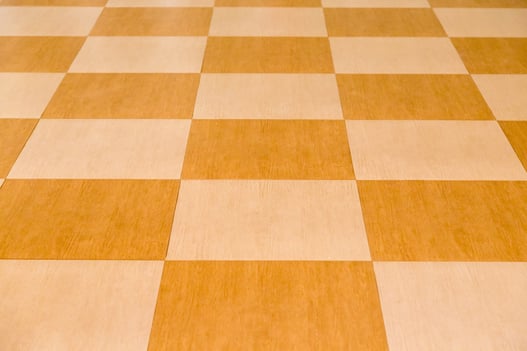
Yes, the second option is just put flooring over it, something like VCT, it’s super cheap, (at first) probably around $2.00 – 4.50 per foot depending on the preparation to the slab needed and the VCT chosen. This can be an acceptable option especially if you’re a “short-timer”, only going to be there 4 – 6 years, why? Depending on the amount of traffic and the substrate conditions, you will only get 5 – 8 years, average, of life out of VCT under these (Grocery Stores) conditions and then you must replace it. The down side, and it’s a big one, is this: next time around it’s more expensive to replace the VCT as you must now pay to remove the old VCT (you installed 6 – 8 years ago) and prep the floor for a reinstall of new VCT. This will increase the install cost this time around by around 50% to get you another 5 – 8 years.
This option starts out cheap, but you can see that for 10 – 15 years of use in this scenario you are at $10.00 - $15 bucks a foot or easily more for only 10 – 15 years of service. This option is getting more expensive with every year that goes by. And in time, say 20 years? It can easily become the most expensive option to choose.
My opinion? if you’re a “short-timer” it’s ok to just cover the floor with VCT, LVP or LVT or possibly commercial carpeting because you’re not going to be there that long and materials like VCT is inexpensive and installs very quickly giving the end-user a nice floor at a very good price and for the ”short-timer” might be a good option.
To be fair to VCT,
while I'm not a fan of VCT, I have over the course of my career, literally ripped up and installed square miles of the stuff. And, it is true that there are many, many, VCT floors out there with far more years of wear than the 5 - 8 years mentioned, VCT floors that are 30 & 40 years old or more and still look good and preforming well, But, a large percentage of floors at this age and especially in the grocery store environment are showing signs of failure, damage or discoloration making them a floor that is not aesthetically acceptable and needs to be replaced.
So, in a short term scenario, VCT and materials like this might be fine. but for 20 years of floor use using VCT, it will cost you around $15 - $20 a sq. ft. This is not cheap!
- BUST IT OUT AND START OVER …..
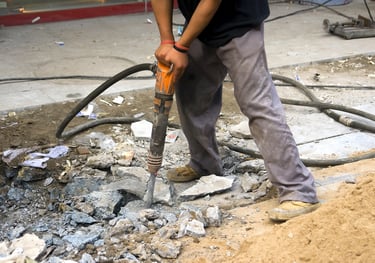
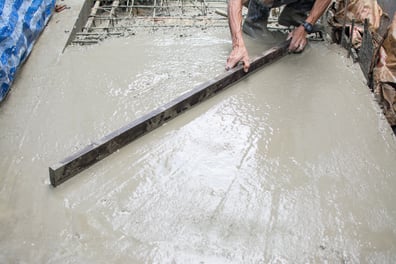
Some people refer to this as the “nuclear option” or the last option you want to consider! The reason? Because of the high price and long downtime associated with slab removal and replacement. That having been said, jackhammering or sawing up the old slab and re-pouring a brand-new slab is an option. This option is actually nice, sorta, if extended time, a huge mess and a cost that can be alarming is not a problem. Questions like how deep is that slab you are removing? What is buried under there that you will run into? How accessible is the slab? Can you wait 28 days after you pour to polish it? If you’re on a “post tension slab” you can forget this option for all the obvious reasons.
So, tear out & replace is an option and the positive side with this option is that you now have control of the new slab to be poured and when done correctly, you get the best results for a beautifully polishing concrete floor. but, in most cases, for the reasons mentioned, it’s probably not a good option. The cost?... It is really all over the place depending on so many variables but, on residential applications you can expect to spend around $7 – $10 per foot to remove the slab and another $5 – $7 to repour new. So, $12 - $17 per foot and then you must add in the cost to polish the new slab.
Now, how about pricing in the commercial world that most of us live in? to be candid, I wasn’t sure. But, I knew the cost is a lot more than residential! And I also know who to ask,... I asked Mark! Mark is an older guy that I have known for many years. He has been building and reconstructing high-end commercial buildings here in the Pacific Northwest for well over 35 years! Mark knows concrete and commercial pricing. So, what number did Mark use? Put your coffee down,
On a big job, $37.50 per foot and on a smaller job $70.00 per foot wow! That is really expensive, and then you have the cost of polishing the concrete after the new is placed. So, the "nuclear option" is an option, just an expensive and time consuming one.
- CERAMIC OR STONE FLOORING…
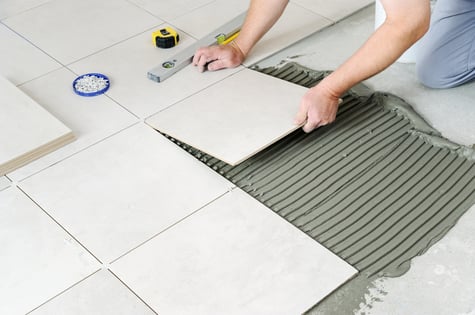
Ceramic and stone floors are a possible option as well, this option is more suited to smaller projects though. Tile cost and installation cost is really all over the place depending on the tile selected and design detail. So, you need to be cautious when considering this option and get bids on the exact material you are looking to install. Remember, you will need to grind the floor before installing tile because, remember, we are going over a ugly polished concrete surface, the surface will be so smooth that it quite likely will not make a acceptable bond with the mortar. so, it must be ground first. The price you can expect to spend on this type of flooring can run $10 - $18 sq. ft. with possible prices below this number and a lot above, the cost of the materials varies that much.
5. OVERLAYMENT…..
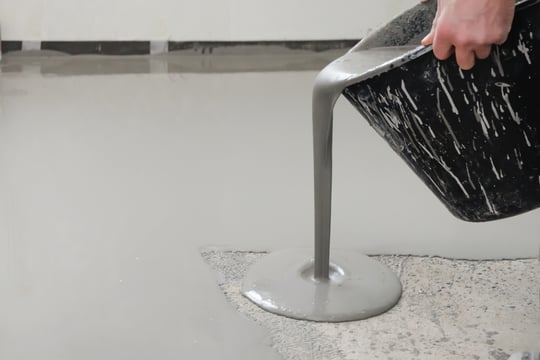
Yeah, as you probably figured out, I like this option, concrete overlayment and polish are the closest you can get to a true concrete polished floor and gives you a lot of cool options.
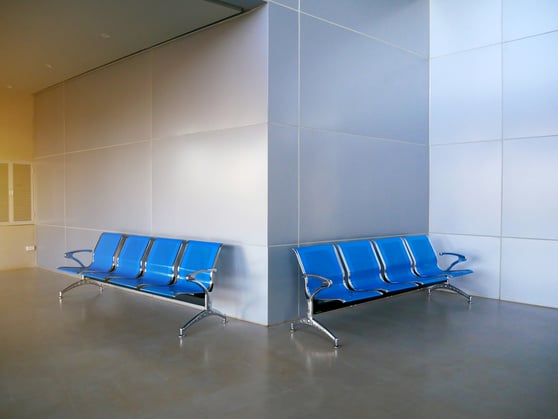
As the pic shows, overlayments can be beautiful! These finishes, when poured and finished correctly give the end-user years of high performance along with a very low amount of maintenance needed.
There are also, a wide variety of types of overlayments and finishes that can range from a cost-effective finish around $3 – $5 bucks per foot, $7 – $13 if you are polishing the overlayment to well over $20 bucks per foot and more.
Keep in mind, this is not including the prep you must do before pouring an overlayment. these overlayments when polished, gives you a very consistent mostly salt & pepper finish. But, many other finishes are possible as well, for instance, a skilled contractor can "broadcast" into the pour a Varity of aggregates like colored glass, brass, different materials that when polished give a beautiful and unique look to your floor. it just depending on your taste, imagination and depth of your pockets!
CONCLUSIOIN…
So, while the costs for any of these replacement options vary greatly, we do begin to see replacement costs with these methods running the general range of $4.00 – $16.00 sq. ft. (not including option #3, the tear out and replacement of the slab.)
There of course are other concerns than the cost to be addressed when dealing with an ugly polished floor,
JOB SPECIFIC CONCERNS AND CAUTIONS
all projects have a list of primary concerns specific to that particular project that will differ from project to project. So, the following are a few points contractors and end-users will be concerned about and what method might better address their concerns.
- Financial concerns…(of course #1 is best at no cost) but, for a “short timer”? Probably #2, cover it with VCT and your good for 6 – 8 years and it gets done fast. If we are talking long term, then, depending on the project, but, a basic concrete overlay starting at $3 - $4 bucks, not including polishing start to look pretty good.
- Timeframe… if you need the space back sooner rather than latter, covering it with VCT or like material will always be fastest. It is a quick turnaround option. Conversely, when time is an issue you want to stay away from the remove & replace option as this is very time consuming, removing the old slab, re-pouring, waiting 28 days to cure and then the time to grind and polish the floor.
- Long term aesthetics… easily either option #3 or #5, densified & polished concrete and overlayments has a very long use range, these durable surfaces basically removes the need for replacement in the foreseeable future, with minimal maintenance you are done with the floors! What I also really appreciate about densified and polished concrete is that you can inspect concrete floors that were densified well over 60 years ago and see that the slab is still preforming just like it did when it was originally densified in the 1950’s, that’s impressive.
- Large warehouse spaces and large square foot areas… in really large projects one might go with option #1 as performance may be more important than aesthetics. And if there are areas where aesthetics are important, you could pour a polishable overlayment in just those areas considerably lessening the cost.
- Timeless look… remember the cool colors of the 1980’s, the 1990’s and early 2000’s? I remember them as well and no one wants to see them again. But, Polished concrete is neutral, most dyes you might use can be very neutral, just don’t give into dyes with flashy colors that look good now but will not be acceptable in the future. So, with few exceptions, finishes like VCT and carpet are expected to have a limited lifespan because, the color we use today will not be the color we want in 10 years or so.
- Green decision… if being ecofriendly is a consideration then option #1 is clearly best, living with the imperfections has zero impact on the environment.
Option #3 when recycling the old concrete as everyone today does has a very small impact on the environment as well. Why is this such a “GREEN” option? Because, with this option, you’re not manufacturing anything, like VCT that would be installed over the existing slab just to get torn out, thrown into a landfill somewhere and replaced a few years from now with another manufactured product, just to have the cycle repeat itself.
When you polish a concrete floor, the only thing you apply to it is the densifier solution and densifier is a naturally found substance with basically no negative effects to the environment, Truly polished concrete is just a floor that has been changed, It is the perfect green option, nothing is added or taken away, just changed.
I hope this information has been useful, finding solutions can be a challenge. But, with a little research we are able to find potential solutions to what to do with ugly polished concrete.
Check out the link below for a full list of blogs we have dealing with a wide variety of topics dealing with concrete and the machines that prep, screed, trowel, cut, scrape, grind, scarify, and shot-blast concrete surfaces.
CLICK HERE FOR A COMPLETE LIST OF BARTELL GLOBAL RELATED BLOGS
JUST A QUICK, IMPORTANT RELATED POINT…
Everything, good or bad happens as a direct result of the preparing or profiling of the existing concrete surface making it an acceptable surface to adhere to for your chosen option to deal with that an ugly floor. Flooring manufacturers and concrete overlayment manufacturers all have specs, insulation requirements that must be adhered to so their products bond correctly to the concrete substrate and the manufacturer will stand behind their products only if these specs have been adhered to.……and this becomes more and more critical of a point as you decide to spend more money on the project, my point is this, a flooring failing after you spent $3 per foot is bad enough and easier to take than if you just spent $20 per ft. So, just like a house needs a good foundation, so does your concrete floor and the surface prep is that foundation.

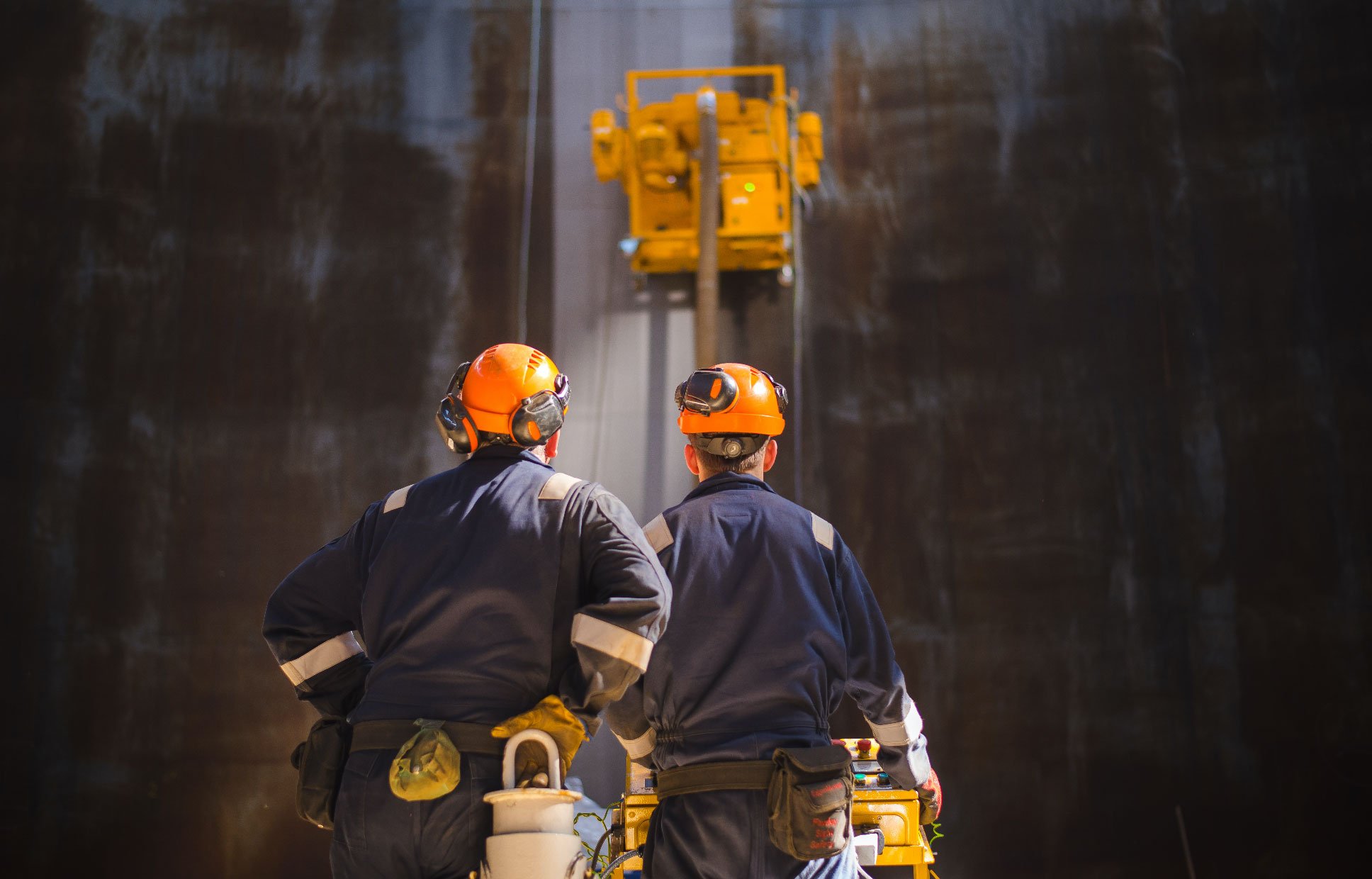
 By
By 